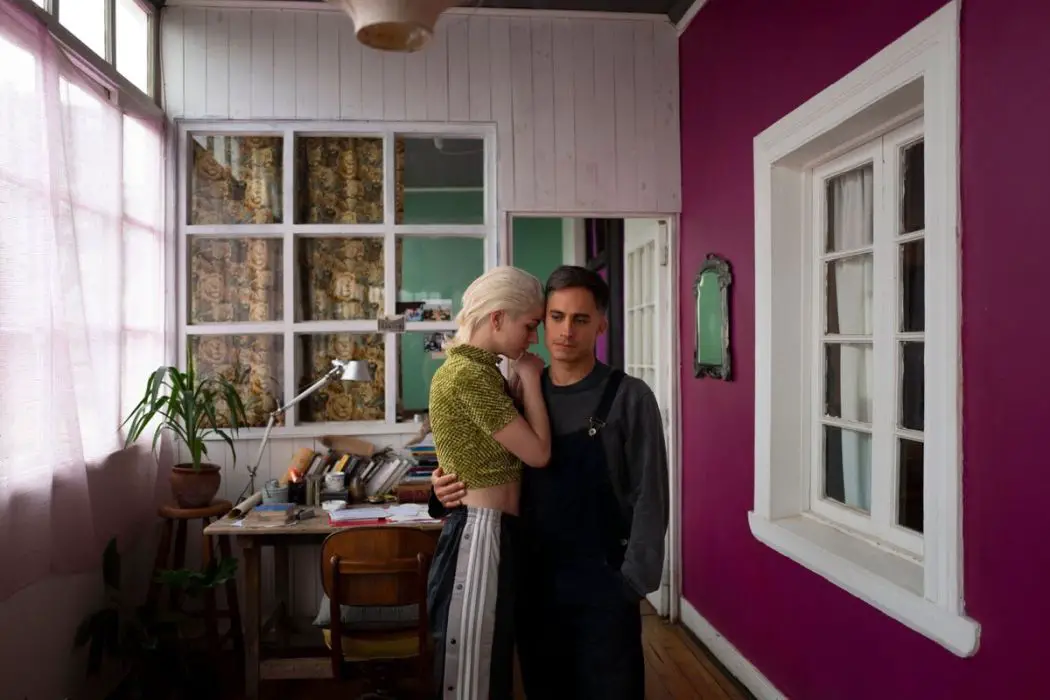TIFF 2019: Pablo Larraín’s Rapturous Dance Melodrama EMA

Monique Vigneault is a Mexican-Canadian film critic. She regularly covers…
After his critical success in both Jackie and Neruda, Pablo Larraín‘s latest strays away from the biopic and returns to his Chilean roots with Ema, a rapturous, anarchic, sexually-charged dance melodrama, resonant of early Almódovar. The score, composed by Nicolas Jaar, is a pulsating, hybrid beat that thumps along with its ambivalent, gravelly protagonist.
Starring newcomer Mariana Di Girólamo and Latin cinema’s resident dream-boy Gael García Bernal, the film follows Ema, a Reggaeton dancer in her twenties and her husband, Gastón, as they navigate their tempestuous relationship. Recently reeling from an arson incident which led to the two returning their adopted seven-year-old, the two spend the course of the film flinging devastating lines back and forth at each other.
And boy are they punchy – each scathing line burrowing deeper and deeper into the other’s skin.
An Anarchic, Hybrid Melodrama
What follows in the next hour or so is a wild, unbarred frenzy of banal, furious acts of both sex and rage, as Di Girólamo‘s character swims through her own internal turmoils as a failed mother along with her struggle to break free. Sporting a slicked, bleached Tilda Swinton-esque hairstyle and hype-beast garb, we watch Ema sidle her way down the port town of Valparaíso with a flamethrower, having a penchant to burn things down to nothing.

What she’s trying to break free from, and to what, precisely, is unclear. What we can gather from the explosive, rapturous dance sequences is that dance in Ema is used as a freeing narrative device, as the body’s way of coping with an internal upheaval so grave, it must find a way to purge it.
A Cross-breed of Camp and Melodrama
Gastón, who choreographs Ema’s dance group, creates these contortionist, fevered dances which feel like a catharsis for both his and Ema’s interminable strife. One such compelling scene, features Gastón emerging from backstage as his dancers cavort in front of a red, flaming planet projected onto the screen behind them. In Ema, dance serves as catharsis.
On the other hand, one could argue Larraín takes it too far with this wild, unchained tale. There are entire sequences which feature nothing but anomalous, outré group sex under neon lighting. You can almost feel the audience writhing in their skin, forced to endure the extremity of Ema’s mental problems for themselves. In this, Larraín takes his film to the same extreme auteur Gaspar Noé often does, giving Ema the feel of an, at times, unbearable art piece.

This of course vanishes quickly once the turns of plot slowly unravel and reveal themselves to us, and we’re once again engulfed in the combative nature of both Ema and Gastón’s stifling relationship, along with their equally confused outside affinities.
Conclusion: Ema
There’s no doubt: Ema is certainly the most unpredictable, wild, and unconventional study of a frayed woman I’ve seen at this year’s TIFF. Larraín uses turns of plot in a way that, by the final credits, leaves the audience with their mouths hanging open. Larraín‘s latest transcends the very act of genre in cinema, resulting in a cross-breed of fluorescent visuals, Reggaeton-techno and camp melodrama.
While Ema is undoubtedly a fantastic, refreshing piece of cinema, with sharp wit, striking cinematography and plot, the message behind this tale of complete sexual and individual liberation is sparse and empty. We’re left right back where we started in the opening scene: a lone figure at dusk, decidedly ready to burn everything around her.
Like Ema, we find no answers to her need for complete and anarchic destruction of both her life, and those around her.
Watch Ema
Does content like this matter to you?
Become a Member and support film journalism. Unlock access to all of Film Inquiry`s great articles. Join a community of like-minded readers who are passionate about cinema - get access to our private members Network, give back to independent filmmakers, and more.
Monique Vigneault is a Mexican-Canadian film critic. She regularly covers world cinema on the festival circuit.













